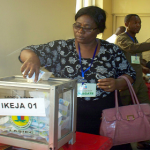Nigeria, a country often seen as one of the few political success stories out of Africa, is set for its general election on March 28. The country has been a democracy since the late 1990s, and has had a relatively stable political climate over the last decade. That stability became an economic boon – Nigeria saw a sudden spurt of economic growth in the last 10 years, with the GDP rising from $169.48 billion in 2010 to $522.64 billion in 2014.
The steady rise of the middle class, one of Nigeria’s seldom discussed successes, has aroused the electorate’s hunger for development and growth. The government has seen success in telecom penetration, and keen on replicating this success, began to privatise the energy sector in 2014, hoping to resolve the country’s energy woes. International and domestic investment in manufacturing, telecommunications, energy and infrastructure has increased over the past five years; the resultant job creation has instilled a sense of hope and belief in the citizenry.
Oil-rich Nigeria, with a population of 170 million – expected to rise to 200 million by 2020 – is considered a major market in Africa, full of business opportunities. The U.S., China and India are major players in the Nigerian market and are also the top three investment and trading partners.
India-Nigeria relations have deepened steadily. In 2013-14, India became the largest buyer of Nigerian crude, with purchases of over $12 billion annually, or 400,000 barrels per day. Over 100 Indian companies operate in Nigeria in sectors from telecom to energy, pharmaceuticals and machinery. Bilateral trade was estimated at around $20 billion in 2014, and the governments are working towards signing the Double Taxation Avoidance Treaty soon.
However, such global optimism is dampening, the outcome of other elements not playing out so well in Nigeria. The emergence of terrorist outfit Boko Haram in the Northeast, has taken some of the shine off Nigeria, intensifying a regional and religious divide between the northern and southern states. There is rampant corruption in government. The recent drop in crude oil rates across the globe has massively devalued the Nigerian naira against the dollar; this in a country where the oil and gas sector accounts for 35% of GDP. The spread of the Ebola virus has revealed a weak healthcare system—in addition to high unemployment rates, a widening economic disparity, a shoddy education system, power crises and poor infrastructure.
All these have deeply affected the confidence of a rising nation and its aspirational populace.
The upcoming March 28 national elections is reflective of Nigeria’s troubles. The contest between the two major parties in the country is fierce: the People’s Democratic Party (PDP) led by incumbent President Goodluck Jonathan, and the All Progressives Congress (APC) led by former dictator and retired major-general Muhammadu Buhari. The PDP has consistently won elections since the country’s 1999 transition to democracy, despite accusations of vote-rigging in the last two elections. But multiple failures and shortcomings displayed by the incumbent president and his current establishment—especially their inability to respond to Boko Haram and the kidnapping of over 300 schoolgirls in April 2014 – have led to calls for change by the electorate, giving Buhari his best chance for victory so far.
The precarious nature of the election was highlighted when the Independent National Electoral Commission of Nigeria (INEC) decided to postpone the elections by six weeks, citing an increase in terrorist activities by Boko Haram. Although the recent successes and advances against the group—through the creation of a strong partnership with the neighbouring Cameroon, Niger and Chad— have been promising, the actual terrorism has created a vacuum in the economic and business activity of Nigeria. Businesses and investors alike have put their plans on hold until the formation of a new government, leading to economic depression. Fortunately, this has not negatively impacted Indian projects in Nigeria or bilateral trade.
Apart from the mishandling of Boko Haram, other issues such as corruption— as seen in the 2014 $20 billion crude oil scandal—has strengthened Buhari’s hand. The former dictator’s reputation as a strict disciplinarian with zero tolerance for corruption, has generated an aura of hope and change. Local and international opinion polls suggest that Buhari could win the 2015 elections by a comfortable margin.
Even if true, these elections have multiple regional and religious characteristics that makes it difficult to predict a clear winner.
Nigeria is sharply divided over religious, regional and tribal lines, which could turn these elections violent in some areas of the country. There are multiple points of contention between the Muslim-dominated North and the Christian-dominated South, but the main one is over the resource divide. The northern states have access to limited resources and feel neglected, while southern states reap the benefits of having 100% access to Nigeria’s largest natural resource—crude oil. The parties are similarly divided, with APC being a ‘northern party’ and PDP being a ‘southern party’.
Which way will Nigeria turn? Will it be overwhelmed by its problems, or will it strive to overcome them to achieve its promise? The world is watching the polls with keen interest.
Aditya Shirish Rao is Chief Executive Officer of Signature Group Ltd., a group involved in Media, Publishing, Events and Hospitality. He is also a Board Member of Meequip Xtras Nigeria Ltd., a company that undertakes distribution of orthopedic implants and allied equipment in Nigeria.
This article was exclusively written for Gateway House: Indian Council on Global Relations. You can read more exclusive content here.
For interview requests with the author, or for permission to republish, please contact outreach@gatewayhouse.in.
© Copyright 2015 Gateway House: Indian Council on Global Relations. All rights reserved. Any unauthorized copying or reproduction is strictly prohibited


